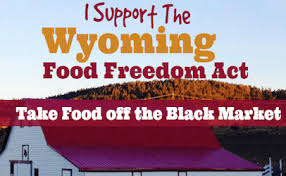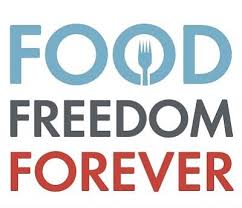We have talked about Food Freedom before, but what do you really know about the Food Freedom Movement?
 Earlier this year, a new Food Freedom law took effect in Wyoming that exempts producers from “licensure, permitting, certification, inspection, packaging, or labeling” regulations when selling food (with the exception of non-poultry, processed meat) directly to the “informed end consumer” for personal use.
Earlier this year, a new Food Freedom law took effect in Wyoming that exempts producers from “licensure, permitting, certification, inspection, packaging, or labeling” regulations when selling food (with the exception of non-poultry, processed meat) directly to the “informed end consumer” for personal use.
Titled the “Wyoming Food Freedom Act” and sponsored by a freshman legislator, it passed the House 57-1 and passed the Senate 20-8. Wyoming’s effort may likely see replication elsewhere; similar legislation has been filed in  Missouri, Maine, and Virginia. In Maine, eleven cities have enacted “food sovereignty” ordinances purporting to exempt their citizens from state and federal regulations for farmer-to-consumer direct sales.
Missouri, Maine, and Virginia. In Maine, eleven cities have enacted “food sovereignty” ordinances purporting to exempt their citizens from state and federal regulations for farmer-to-consumer direct sales.
Due in part to increased costs—but also out of a desire to enjoy the freedom to determine what they will consume without having regulatory bodies making these decisions for them—the food freedom movement is being led not by the producers, but by consumers.
For more information about the Food Freedom Movement, and what is happening in Utah, check-out the Public Policy Brief regarding Farms, Food, and Freedom: Informed Consumerism in Utah, prepared by the Libertas Institute.
SUMMARY:As industrialization of America’s food system has increased in the past half a century, so too has its centralization. The average person has become almost totally disconnected fromtheir food supply.This distance between farm and fork has led to a lengthy list of regulations, intended to protect the health of the uninformed consumer who does not, and cannot, know anything about the safety, security, or quality of what they are buying.Such regulations are unnecessary, and therefore should not be required, of producers who sell directly to informed consumers who can either inspect the farm’s assets and processes, or buya product knowing that it is free of regulation.
While regulation can protect the health of consumers not connected to their food and where it comes from, it is not needed – and should not be required – in direct sales situations, where consumers have a relationship with the people who produce their food, and they have the opportunity to see and participate in how it is being produced. These are truly informed consumers.
Freeing up small farmers will increase their number, reduce restrictive compliance costs, and protect the freedom of both parties, thereby confining regulation to its proper domain.
Should People have a Right to Make Fundamental Choices About their Food?
In asserting the right to be free from such regulation in a direct sale relationship between farmer and consumer, it raises a more fundamental question: is there a right to food, and freedom of choice about food?
The simplest way to address the question is to imagine the absence of government—in a society free of legal restraint, would you have the right to grow, share, and consume food in a free exchange with others? Clearly the  answer is yes. Another way to address the question is to consider whether you can morally and legitimately use force against your neighbor for growing, sharing, and consuming food in a free exchange with others. Clearly the answer is no; lacking this authority, we cannot delegate it to the government as a third party enforcer. As the famous farmer Joel Salatin has said, “the only reason the founders of our great republic did not include food rights alongside the right to bear arms, to speak, and to worship was because no one at that time could have envisioned a day when citizens could not acquire the food of their choice from the source of their choice.”
answer is yes. Another way to address the question is to consider whether you can morally and legitimately use force against your neighbor for growing, sharing, and consuming food in a free exchange with others. Clearly the answer is no; lacking this authority, we cannot delegate it to the government as a third party enforcer. As the famous farmer Joel Salatin has said, “the only reason the founders of our great republic did not include food rights alongside the right to bear arms, to speak, and to worship was because no one at that time could have envisioned a day when citizens could not acquire the food of their choice from the source of their choice.”
Where Do Things Stand in Utah?
According to the Libertas Institute, Utah has an opportunity to join this important movement—one based on individual liberty, informed consumerism, and a recognition of the right to commerce free from unreasonable restrictions and regulations. According to Libertas:
We encourage the Utah legislature to pass the following, for which we have proposed suggested language:
1) a constitutional amendment recognizing and protecting a person’s right to food; and
2) a statute exempting direct sales between food producer and informed consumer from local, state, and federal food and safety regulations
Click to access food_freedom.pdf
You may also like
-
John Hoak scorches Walmart for restrictions on firearms and ammo sales
-
The Hammond Case Clearly Demonstrates the Lack of “Adult Supervision” Over Federal Agencies in the West — Guest Editorial — by William Perry Pendley
-
The Case for Civil Disobedience in Oregon — Guest Editorial — by David French
-
Utah and Other States Mull Legal Action Against the Blundering EPA & Federal Government
-
The Illusion of Freedom in America — Op/Ed — by John Whitehead


